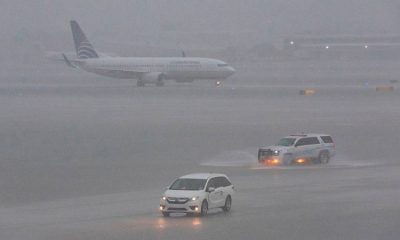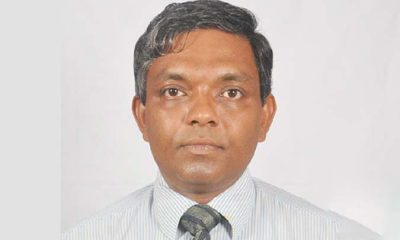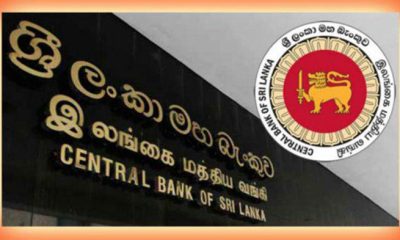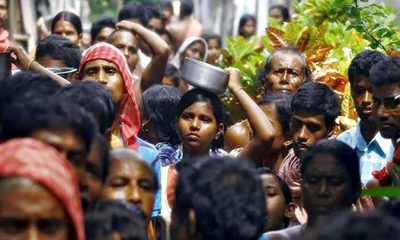News
Fresh call to uncover Lanka mass grave secrets

Gota stalled police probe into mass graves: Report
ECONOMYNEXT –Five civil society groups are calling for government action to investigate mass graves which they say contain the remains of so-called “disappeared” in various civil conflicts on the island.
In a press release issued on June 22, the groups insisted that “if the Sri Lankan government is serious about dealing with the past it must commit to have international observers at all exhumations of mass graves.”
The festering issue of the disappeared has not been addressed in any systematic way by successive governments despite frequent promises.The Office of Missing Persons (OMP) created by the Yahapalanaya government has proved to be a disappointment.
Brito Fernando of the Families of the Disappeared says that after three decades and twenty attempted exhumations, only a handful of bodies have ever been identified and returned to families.
“We all know tens of thousands of bodies lie in shallow graves all over the island, so we can’t describe this dismal rate of progress as bad luck – it’s a clear lack of political will,” he added.
The five organizations released a detailed report on the past investigations into mass graves. It meticulously reveals the government’s “systematic interference with investigations” a statement issued by the five organizations said.
A 30-minute documentary film, “In Plain Sight – Searching for Truth Behind Sri Lanka’s Mass Graves”, was also screened at the event, illustrating how long and hard the families of the disappeared have struggled for the truth. The documentary explores the connection between disappearances and mass graves in Sri Lanka by focusing on different narratives, including those of affected families and loved ones, the press release said.
Investigations into a mass grave found near the Matale hospital prompted the joint report. The remains exhumed at that location in 2013 are believed to be of the hundreds of people who went missing during the late 1980s.
“Matale was the scene of hundreds of disappearances in 1989 when the former President Gotabaya Rajapaksa was the district military coordinator of the area; he was later named as an alleged suspect by a Presidential Commission of Inquiry” the press release said.
It added that a group of UN experts “wrote to the Government of Sri Lanka this year to ask what it had done to investigate and hold Gotabaya Rajapaksa and other alleged perpetrators accountable but there was no reply.”
Yasmin Sooka, executive director of the International Truth and Justice Project in South Africa was quoted in the release as saying that this “shows that documenting the crimes, collecting the evidence and preserving it is just the first step – thirty years later we still find ourselves fighting for truth and justice; without which the guarantee of non-recurrence remains elusive.”
“Accountability is not an optional exercise – it’s essential for building a future for all Sri Lankans,” she added.
The report examines the way investigations throughout the island have been stymied whether the mass graves are in the south or the north and east.
Magistrates and forensic experts have been transferred abruptly, police have delayed carrying out judicial orders, families’ lawyers have been denied access to sites, no effort has been made to find living witnesses, no ante mortem data has been collected, the Attorney General’s Office has dropped the case, and, in the very rare instances where someone was convicted, they were then pardoned, the report alleged.Though a new inquest law and standard operating procedures have been drafted, they have not been made public, nor have the families been consulted.
“There is total lack of political will with regard to mass graves investigations and enforced disappearance in Sri Lanka,” said K.S. Ratnavale, executive director of the Centre for Human Rights and Development who has represented families in mass grave cases.
“Added to this, the Attorney General’s Department views such mass grave investigations as part of ordinary criminal proceedings and is hostile to victim families.
This was evident in the Mannar mass graves investigations. While in Matale the magistrate who held an impartial inquiry was transferred with immediate effect. Thus, political interference is rampant in order to protect the interests of the Sri Lankan military and their political masters,” he added.
In Mannar, 318 bodies (including 28 children) were exhumed in 2018. Among the objects that were recovered were metal bindings which had been used to tie legs together.In Matale, some of the skeletal remains reportedly had bullet holes, and others were found to have their hands tied behind their back. There too, objects were found that a forensic archaeologist dated to the late 1980s.
Nevertheless, the Department of Archaeology stated that the Mannar site was a normal cemetery and a Commission set up by then President Mahinda Rajapaksa concluded the Matale grave dated from the 1950s.
“We are good at burying in this country but not at unearthing the truth,” says Bashana Abeywardane of Journalists for Democracy in Sri Lanka which co-authored the report.
“We need to collect ante-mortem data from the families of the disappeared and meticulously locate the hundreds, if not thousands, of remaining mass graves with the help of international experts. Only then should excavations start” he added.
News
Amendment of the Inland Revenue Act No. 24 of 2017
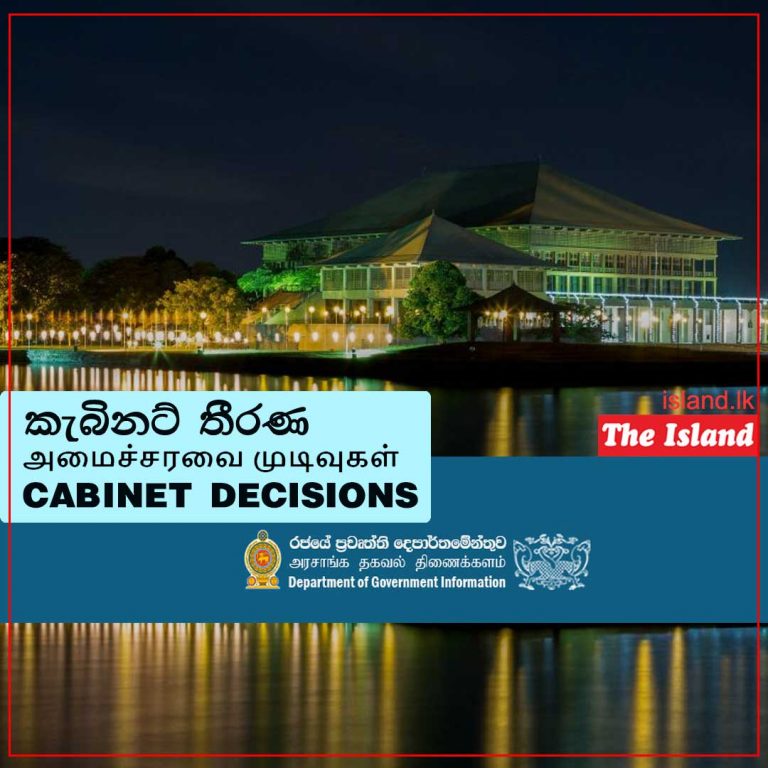
Approval of the Cabinet of Ministers has been granted at their meeting held on 19.05.2025 in order to introduce amendments to the Inland Revenue Act No. 24 of 2017 including the proposed tax revisions to enhance the tax structure paving way for state financial integrity based on revenue.
Accordingly, the revised draft bill has been prepared by the legal draftsman and clearance of the Attorney General has been received.
Therefore, the Cabinet of Ministers has granted approval for
the resolution furnished by the President in his capacity as the Minister of Finance, Policy Planning and Economic Development to publish the aforementioned draft bill in the government gazette notification and subsequently, forward the same to the Parliament for its concurrence.
News
Cabinet nod for “National Mineral Policy” – 2026
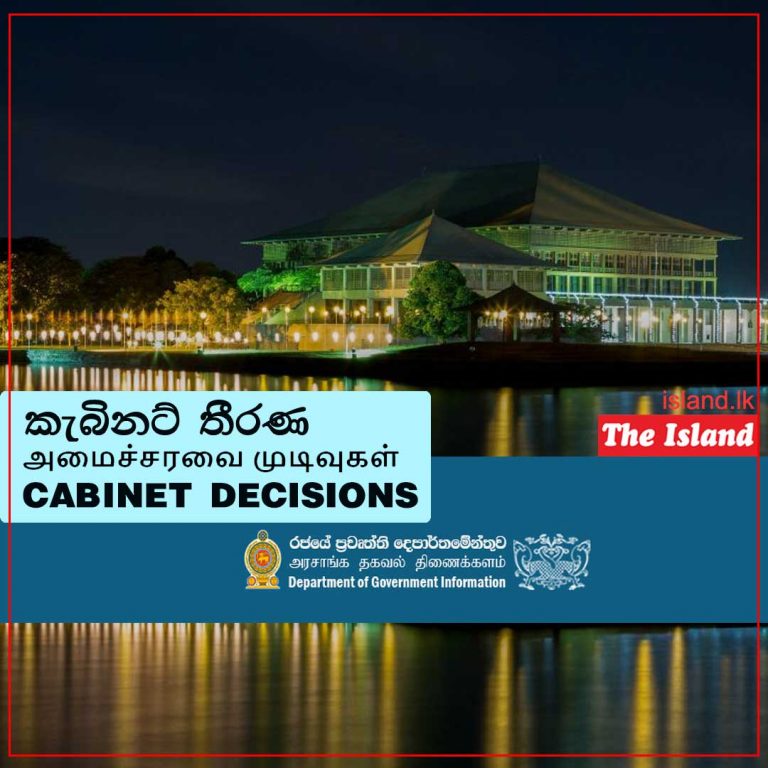
The National Mineral Policy was prepared for the first time in the year 1999, and the aforementioned policy has been amended in 2023 to cover matters such as preparing an updated data system related to mineral resources, adding value to the export of minerals, encouraging mineral-related industrialists, extracting mineral resources and managing the environment sustainably, and resolving the issues related to the ownership of the land arising in extracting mineral resources.
The revised National Mineral Policy has been reupdated in line with the manifesto “A Sustainable Resource Utilization – Generation of the Highest Benefit” under the policy statement of the current government” A Thriving Nation – A Beautiful Life.”
Accordingly, the Cabinet of Ministers has approved the resolution presented by the Minister of Industries and
Entrepreneurship to implement the so-formulated “National Mineral Policy—2026.”
Latest News
Twelve sentenced to death by Gampaha High Court

The Gampaha High Court has sentenced Twelve (12) individuals to death over the 2022 murder of former Polonnaruwa District Member of Parliament Amarakeerthi Athukorala and his security officer.
-

 Features4 days ago
Features4 days agoMy experience in turning around the Merchant Bank of Sri Lanka (MBSL) – Episode 3
-

 Business5 days ago
Business5 days agoZone24x7 enters 2026 with strong momentum, reinforcing its role as an enterprise AI and automation partner
-

 Business4 days ago
Business4 days agoRemotely conducted Business Forum in Paris attracts reputed French companies
-

 Business4 days ago
Business4 days agoFour runs, a thousand dreams: How a small-town school bowled its way into the record books
-

 Business4 days ago
Business4 days agoComBank and Hayleys Mobility redefine sustainable mobility with flexible leasing solutions
-

 Business23 hours ago
Business23 hours agoAutodoc 360 relocates to reinforce commitment to premium auto care
-

 Business5 days ago
Business5 days agoHNB recognized among Top 10 Best Employers of 2025 at the EFC National Best Employer Awards
-

 Editorial7 days ago
Editorial7 days agoAll’s not well that ends well?


